高一英语直接引语和间接引语
高一英语Unit 1 grammar直接引语与间接引语-人教版[整理]
![高一英语Unit 1 grammar直接引语与间接引语-人教版[整理]](https://img.taocdn.com/s3/m/8c5ea96ea45177232f60a278.png)
Conclusion
1. 当主句的谓语动词是一般现在时的时候 2. 当主句的谓语动词是将来时的时候 3. 当直接引语部分带有具体的过去时间状 语时 4. 当直接引语中有以when, while引导的从 句,表示过去的时间时 5. 当直接引语是客观真理或自然现象时 6. 当引语是谚语、格言时 7. 当直接引语中有情态动词should, would, could, had better, would rather, might, must, ought to, used to, need时
Tom
said that they were listening to the pop music. Mother asked, “Have you finished your homework before you watch TV?” Mother asked me whether I had finished my homework before I watched TV.
Our teacher said to us, “Light travels faster than sound. ” Our teacher told us that light travels faster than sound. He said,“Practice makes perfect. ” He said that practice makes perfect. He said, “She must be a teacher. ” He said that she must be a teacher. The doctor said, “You'd better drink plenty of water. ” The doctor said I'd better drink plenty of water.
高中英语直接引语和间接引语讲解
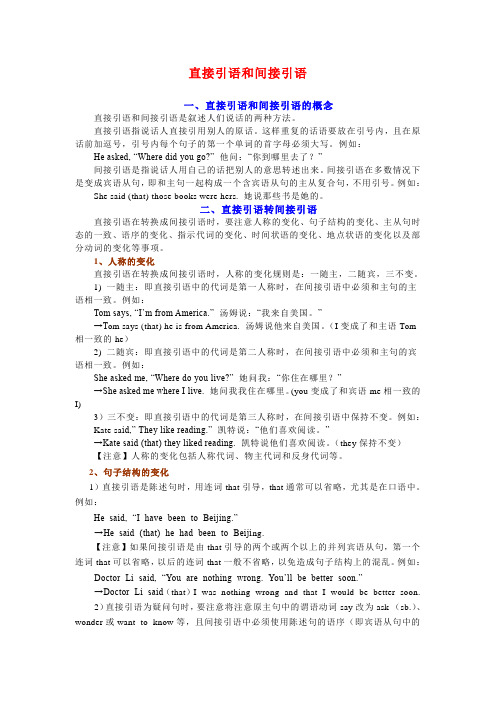
直接引语和间接引语一、直接引语和间接引语的概念直接引语和间接引语是叙述人们说话的两种方法。
直接引语指说话人直接引用别人的原话。
这样重复的话语要放在引号内,且在原话前加逗号,引号内每个句子的第一个单词的首字母必须大写。
例如:He asked, “Where did you go?” 他问:“你到哪里去了?”间接引语是指说话人用自己的话把别人的意思转述出来。
间接引语在多数情况下是变成宾语从句,即和主句一起构成一个含宾语从句的主从复合句,不用引号。
例如:She said (that) those books were hers. 她说那些书是她的。
二、直接引语转间接引语直接引语在转换成间接引语时,要注意人称的变化、句子结构的变化、主从句时态的一致、语序的变化、指示代词的变化、时间状语的变化、地点状语的变化以及部分动词的变化等事项。
1、人称的变化直接引语在转换成间接引语时,人称的变化规则是:一随主,二随宾,三不变。
1) 一随主:即直接引语中的代词是第一人称时,在间接引语中必须和主句的主语相一致。
例如:Tom says, “I’m from America.” 汤姆说:“我来自美国。
”→T om says (that) he is from America. 汤姆说他来自美国。
(I变成了和主语Tom 相一致的he)2) 二随宾:即直接引语中的代词是第二人称时,在间接引语中必须和主句的宾语相一致。
例如:She asked me, “Where do you live?” 她问我:“你住在哪里?”→She asked me where I live. 她问我我住在哪里。
(you变成了和宾语me相一致的I)3)三不变:即直接引语中的代词是第三人称时,在间接引语中保持不变。
例如:Kate sa id,” They like reading.” 凯特说:“他们喜欢阅读。
”→Kate said (that) they liked reading. 凯特说他们喜欢阅读。
高一英语直接引语和间接引语
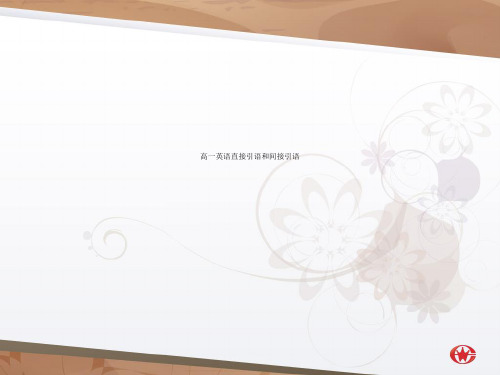
He asked her whether/if she had passed the exam.
Exercise
1. “I like reading adventure stories,” said John. John said that he liked reading adventure stories.
• “I was driving carefully when my car hit the tree.” He told the police.
• He told the police that he had been driving carefully when his car hit the tree.” He told the police.
He said to me, “I’ve left my book in your room.”
He told me that he had left his book in my room.
状 直接引语中的状语 语 now 变 ago 化 today
间接引语中的状语
then before/earlier that day
Phelps said he had started swimming at an young age in order to treat his ADHD disease.
“I receive a 5-hour training every day.”
Phelps said he received a 5-hour training every day.
“I always desire to be the winner, to win gold medals and to break world records.”
高一英语知识点大全

高一英语知识点大全高一英语知识点:直接引语和间接引语1. 直接引语在改为间接引语时,时态需要做相应的调整。
eg: “I broke your CD player.” (一般过去时改成过去完成时)He told me he had broken my CD player.Jenny said, “I have lost a book.”(现在完成时改成过去完成时)Jenny said she had lost a book.Mum said, “Ill go to see a friend.”(一般将来时改成过去将来时)Mum said she would go to see a friend.过去完成时保留原有的时态He said, “We hadnt finished our homework.”He said they hadnt finished their homework.注意直接引语是客观真理,过去进行时,时态不变。
2. 在直接引语变间接引语时,如果从句中的主语时第一人称或被第一人称所修饰,从句中的人称要按照主句中主语的人称变化。
如:Mary said, “My brother is an engineer.”Mary said her brother was and engineer.3. 直接引语如果是反意疑问句,选择疑问句或一般疑问句,间接引语应改为由whether或if引导的宾语从句。
如:He said, “Can you run, Mike?”He asked Mike whether/if he could run.4. 直接引语如果是祈使句,间接引语应改为“tell(ask, order, beg等) * (not) to do sth.”句型。
如:“Pass me the water, please.”said he.He asked him to pass her the water.5. 直接引语如果是以“Lets”开头的祈使句,变为间接引语时,通常用“suggest+动名词或从句”的结构。
高一英语必修一Unit1Grammar语法直接引语间接引语
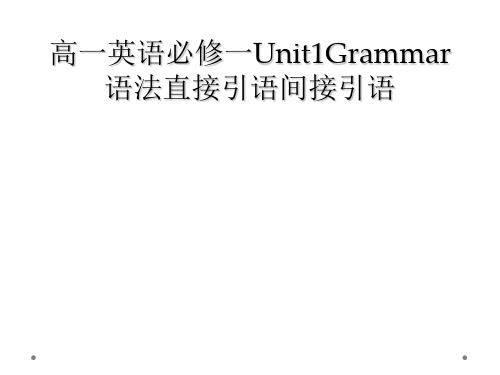
仍用一般现在时。例如: Teacher said to us:" The moon moves round
the earth." Teacher told us the moon moves round the earth. The teacher said to us : “Light travels faster
宾语从句
判断以下哪些句子属于间接引语
She said that she didn’t want to be a teacher. 间接 She said, “I don’t want to be a teacher〞.直接 He said, “ I like playing football〞. 直接 He said that he liked playing football. 间接
3. Mr Black said, “I have walked a long way this week.〞 Mr Black said that __ a long way __. A. I had walked…last week B. he had walked…that week C. I walked…last week D. he has walked…this week
〞 • 间接引语 Mum told me that I could clean my bedroom the next day . • Mr. Smith said,“He is a good worker. ’’ • Mr. Smith said that he was a good worker.
3.人称的变化
• 直接引语里的第一人称和第二人称,变间接引语时,人称要做相 应调整。例如:
人教版高一英语--直接引语与间接引语的转换
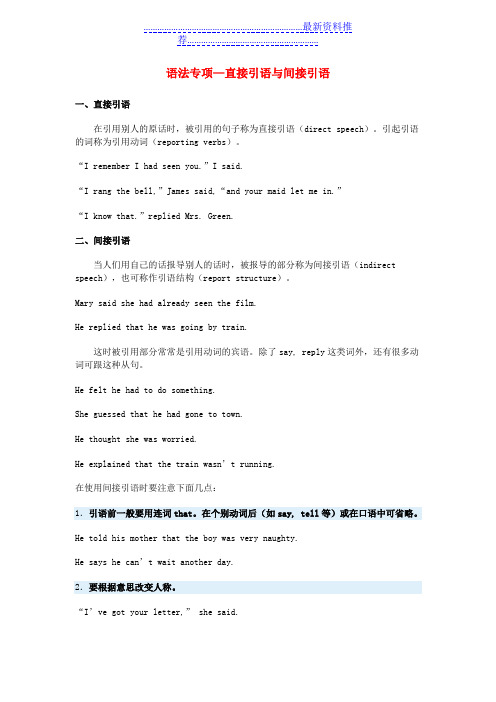
语法专项—直接引语与间接引语一、直接引语在引用别人的原话时,被引用的句子称为直接引语(direct speech)。
引起引语的词称为引用动词(reporting verbs)。
“I remember I had seen you.”I said.“I rang the bell,”James said,“and your maid let me in.”“I know that.”replied Mrs. Green.二、间接引语当人们用自己的话报导别人的话时,被报导的部分称为间接引语(indirect speech),也可称作引语结构(report structure)。
Mary said she had already seen the film.He replied that he was going by train.这时被引用部分常常是引用动词的宾语。
除了say, reply这类词外,还有很多动词可跟这种从句。
He felt he had to do something.She guessed that he had gone to town.He thought she was worried.He explained that the train wasn’t running.在使用间接引语时要注意下面几点:1.引语前一般要用连词that。
在个别动词后(如say, tell等)或在口语中可省略。
He told his mother that the boy was very naughty.He says he can’t wait another day.2.要根据意思改变人称。
“I’ve got your letter,” she said.→She said to him, “Your pronunciation is better than mine.”→3.引语中的谓语要和句子主要谓语在时态上一致。
高中英语-直接引语和间接引语

一、直接引语直接引用别人的原话叫做直接引语,直接引语通常置于引号内(“引用原话”)。
—“What is it all about?”—“究竟是什么事呢?”—“Nothing serious, just a storm in a teacup.”—“没有什么,大惊小怪而已。
”二、间接引语用自己的话转述别人的意思,或引用自己说过的话,都叫做间接引语。
间接引语多数用宾语从句来表达。
Mary said that she received a sugar report this morning.玛莉说她今天早上收到了一封情书。
He said that his hands were quite full at that moment.他说那时他忙得不可开交。
三、直接引语与间接引语的转换在将直接引语转换为间接引语时,不仅句式上要有变化,而且要在时态、人称、时间、地点等方面作相应的变化。
1、引语转换时的句式变化不同的直接引语句式,如:陈述句、疑问句、祈使句和感叹句,转换成间接引语时要遵循一定的句式转换规则,还要注意根据句意,使用适当的引述动词。
(1)陈述句的间接引语将陈述句转换为间接引语,通常用that引导的宾语从句来表达。
连词that 在不引起歧义的情况下可以省略。
引述分句的动词常见的有say 和tell等。
He said, “I caught a cold yesterday.”他说:“我昨天感冒了。
”He said (that) he had caught a cold the day before.他说他前天感冒了。
Helen said to me, “I’m tired of taking such exams.”海伦说:“我讨厌参加这种考试。
”Helen told me (that) she was tired of taking such exams.海伦说她讨厌参加这种考试。
在下列情况下,往往要保留that。
高中英语必修1:Unit 1 直接引语和间接引语

Unit one FriendshipDirect speech and indirect speech(直接引语和间接引语)一.基本概念I直接引语变为间接引语1)、直接引语为陈述句2)、直接引语为祈使句3)、直接引语为疑问句4)、直接引语为感叹句II1、直接引语和间接引语都属于宾语从句2、直接引语和间接引语的概念(1)直接引语:一字不改地引述别人的话(2)间接引语:用说话人自己的话转述别人的话二.变换类型1.直接引语为陈述句直接引语为陈述句,用that引导(口语中可以省略)。
引述动词有:say, tell等。
陈述句变间接引语要注意:1、人称的变化2、指示代词、时间状语、地点状语和动词的变化3、时态的变化4、人称的变化。
一般的规则:一随主,二随宾,三不变例如:The teacher said, “John, you must bring your book to the class. ”1> 第三者说:The teacher told John that he must bring his book to the class.2> 别人对约翰说:The teacher said that you must bring your book to the class.3> 约翰自己说:The teacher said that I must bring my book to the class.I指示代词、时间状语、地点状语和动词的变化1〉指示代词的变化this---- that these----those2〉时间状语的变化now---- then ago---- before today----that day yesterday----the day before; theprevious day tomorrow----the next day; the following day the day beforeyesterday----two days before the day after tomorrow----two days later nextweek/month, etc.----the next week/month, etc. last week/month, etc.----theweek/month before3〉地点状语的变化here----there4〉动词的变化come----go注:在当地转述时,here不变为there,come不变为go.在当天转述时,yesterday, tomorrow等时间状语也不变。
高中英语直接引语和间接引语讲解

2.带有let的祈使句(表示请求,建议或命令),可用suggest + -ing形式或suggest +that从句来表示其相应的意思。
“Let's go for a walk”, said the girl.
那姑娘说,让我们去散散步吧。
→The girl suggested going for a walk.
→My teacher asked me if/whether I liked American country music.我老师问我是否喜欢美国乡村音乐。
“You haven't been toBeijing, have you?”asked he.
他问:你没去过北,是吗?
→He asked me if/whether I had been to Beijing.
时态的变化
①现在时间推移到过去时间
直接引语
间接引语
一般现在时
一般过去时
现在完成时
过去完成时
现在进行时
过去进行时
1
时
态
的
变
化
现在完成进行时
过去完成进行时
②过去时间推移到过去的过去
直接引语
间接引语
一般过去时
过去完成时
过去完成时
过去完成时(不变)
过去进行时
过去完成进行时或不变
③将来时间推移到过去将来时间
直接引语
这女孩建议去散散步。
The teacher said,“Let Lily tidy the classroom”.
老师说:让莉莉整理教室。
→The teacher suggested that Lily should tidy the
高一英语Book1Unit1直接引语间接引语

(3)直接引语中被引述的部分是反复出现 的,习惯性的动作或说话时情况仍然存在 的,变间接引语时, 时态保持不变。
The boy said to us, “ I usually get up at six every day.” → The boy told us he usually gets up at six every day.
二,时态变化
一般现在时 一般将来时 现在进行时 一般过去时 现在完成时 过去完成时
一般过去时 过去将来时 过去进行时 过去完成时 过去完成时 过去完成时
复习规律
1. 陈述句的间接引语—连接词用that, 在
口语中可省略。引述动词用said, told,等。 例如: He said: “I’ve left my book in my room.” → He told me that he had left his book in his room.
around the earth .
(2)直接引语中有具体的过去某年、某月、 某日作状语,变为间接引语时, 时态不 变。 Xiao Wang said. “I was born on April
2l, 1980.”
→Xiao Wang said he was born on April
20, 1980.
3. 特殊疑问句用原句中的疑问词作连接 词,改为陈述语序。例如:
The teacher asked, “How did you repair it?”
→ The
teacher asked me how I had repaired it.
但要注意在以下几种情况下。在直 接引语变为间接引语时,时态一般 不变化。
高中英语知识点归纳直接引语和间接引语的变化规则
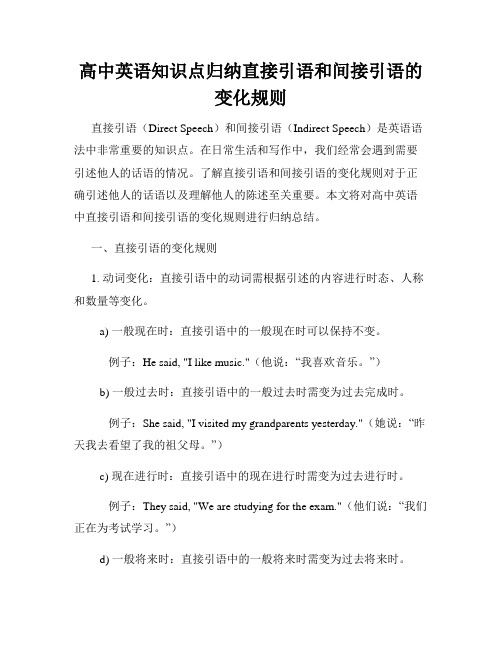
高中英语知识点归纳直接引语和间接引语的变化规则直接引语(Direct Speech)和间接引语(Indirect Speech)是英语语法中非常重要的知识点。
在日常生活和写作中,我们经常会遇到需要引述他人的话语的情况。
了解直接引语和间接引语的变化规则对于正确引述他人的话语以及理解他人的陈述至关重要。
本文将对高中英语中直接引语和间接引语的变化规则进行归纳总结。
一、直接引语的变化规则1. 动词变化:直接引语中的动词需根据引述的内容进行时态、人称和数量等变化。
a) 一般现在时:直接引语中的一般现在时可以保持不变。
例子:He said, "I like music."(他说:“我喜欢音乐。
”)b) 一般过去时:直接引语中的一般过去时需变为过去完成时。
例子:She said, "I visited my grandparents yesterday."(她说:“昨天我去看望了我的祖父母。
”)c) 现在进行时:直接引语中的现在进行时需变为过去进行时。
例子:They said, "We are studying for the exam."(他们说:“我们正在为考试学习。
”)d) 一般将来时:直接引语中的一般将来时需变为过去将来时。
例子:He said, "I will go to the cinema tomorrow."(他说:“明天我将去电影院。
”)2. 代词变化:直接引语中的人称代词(例如I、you、he、she、they 等)需按照引述者的身份进行变化。
例子:He said, "I am going to the park."(他说:“我要去公园。
”)3. 时间和地点变化:直接引语中的时间和地点词语需根据实际情境进行变化。
例子:She said, "I will meet you at the library tomorrow."(她说:“明天我会在图书馆见你。
高一英语直接引语和间接引语课件 人教
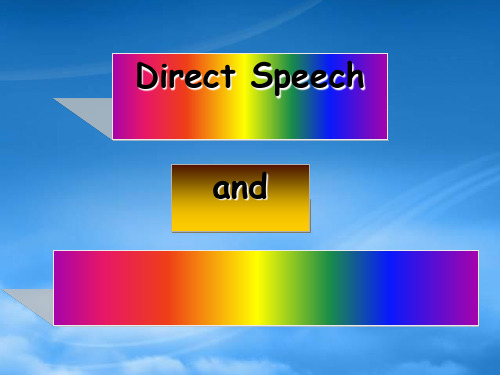
“I don’t know where your bike is,” said the Arab.
“I’m sorry,” the professor said to the class, “but none of you watched carefully enough.”
She asked me if/whether I would go there with her.
She asked, “Did you see the film yesterday, Peter?”
She asked Peter if/whether he had seen the film the day before.
Direct Speech:
用自己的话转述别人所说的内容。通常 以宾语从句的形式出现。当直接引语变 为间接引语时,有关的人称、语序、时 态、代词、时间状语、地点状语、和少 数动词都要作相应的改变。
Indirect Speech:
时 态 的 变 化
直接引语
间接引语
一般现在时
现在进行时
现在完成时
一般过去时
The teacher said in class, “The moon moves around the earth.”
The teacher said in class that the moon moves around the earth.
陈述句 直接引语变间接引语的结构:
特殊ห้องสมุดไป่ตู้问句:
变为间接引语后,仍用原来的疑问词引 导,用陈述语序。时态等作相应变化。
‘’When did they build this bridge?” she asked.
专题06 直接引语和间接引语-高一英语知识点(人教2019必修1-2)

专题06直接引语和间接引语一、定义直接引语:直接引用别人的原话,并在原话前后加引号。
例:He said: “It is too late.”间接引语:用自己的话转述别人的话,多数以宾语从句的形式构成。
例:He said it was too late.二、直接引语变间接引语1. 时态的变化直接引语变为间接引语时,通常受转述动词said, asked等的影响而使用过去化的时态,即把原来的时态向过去推,也就是一般现在时变为一般过去时,现在进行时变为过去进行时,等等:Tom said to me, “My brother is doing his homework.”→Tom said to me that his brother was doing his homework.注:直接引语属下列情况时,时态不作变化:①直接引语属真理或客观事实时:The teacher said to us, “Light runs much faster than sound.”→The teacher told us light runs much faster than sound.②主句谓语动词是现在或将来某个时态:The old man often says, “I joined the Red Army when I was young.”→The old man often says that he joined the Red Army when he was young.③直接引语带有具体的过去时间状语时:如:The politics teacher said to us, "The party was founded in 1921."→ The politics teacher told us that the party was founded in 1921.④直接引语谓语有情态动词:had better,would rather,need,must,ought to等时:He said to me, “I would rather live in the countryside.”→He told me that he would rather live in the countryside.⑤直接引语为虚拟语气谓语时She said, “I would be happy if I were a bird.”→She said that she would be happy if she were a bird.2. 人称代词、指示代词、时间状语、地点状语等等要根据意义进行相应的变化。
高中英语知识点归纳直接引语和间接引语的特殊情况
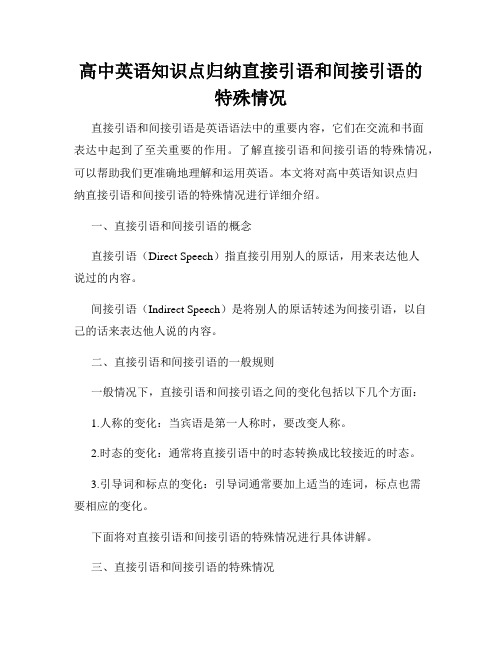
高中英语知识点归纳直接引语和间接引语的特殊情况直接引语和间接引语是英语语法中的重要内容,它们在交流和书面表达中起到了至关重要的作用。
了解直接引语和间接引语的特殊情况,可以帮助我们更准确地理解和运用英语。
本文将对高中英语知识点归纳直接引语和间接引语的特殊情况进行详细介绍。
一、直接引语和间接引语的概念直接引语(Direct Speech)指直接引用别人的原话,用来表达他人说过的内容。
间接引语(Indirect Speech)是将别人的原话转述为间接引语,以自己的话来表达他人说的内容。
二、直接引语和间接引语的一般规则一般情况下,直接引语和间接引语之间的变化包括以下几个方面:1.人称的变化:当宾语是第一人称时,要改变人称。
2.时态的变化:通常将直接引语中的时态转换成比较接近的时态。
3.引导词和标点的变化:引导词通常要加上适当的连词,标点也需要相应的变化。
下面将对直接引语和间接引语的特殊情况进行具体讲解。
三、直接引语和间接引语的特殊情况1.特殊疑问句的引述当直接引语是特殊疑问句时,间接引语要使用“asked”或者“wondered”等动词引导,同时要将疑问句改为陈述句。
例子:Direct Speech (直接引语): "Where are you going?" he asked.Indirect Speech (间接引语): He asked where I was going.2.陈述句的特殊情况当直接引语是陈述句且为真理、客观事实或总结性陈述时,间接引语不需要改变时态、人称和时间等。
例子:Direct Speech (直接引语): "Water boils at 100 degrees Celsius."Indirect Speech (间接引语): He said that water boils at 100 degrees Celsius.3.祈使句的引述当直接引语是祈使句时,间接引语中要使用“tell”或者“ask”等动词引导,同时要注意将时态、人称和标点做相应的调整。
高一英语直接引语和间接引语 新课标 人教

They asked him
if
It is easy to improve the condition of the soil.
it is easy to improve the condition of the soil.
2. 对一般疑问句的转述,常使用连词 whether/ if (只限于动词宾语从句) The teacher asked, “Are you ready for the exams?” The teacher asked us if we were ready for the exams. She asked, “Are you fond of classic music?” She asked me whether I was fond of classic music.
2. 如果直接引语所表述的内容在目前和说话时同样有效,变间接引语时,时态可不变 The children said, “We love this game.” The children said that they love that game. 3. 主句谓语动词的时态是现在时态,在引述时,时态不变。 She says, “I’ll never forget the days in the country.” She says that she’ll never forget the days in the country.
直接引语变间接引语的几种情况: 1. 对陈述句的转述,常使用连词 that 连接 “I have received the letter,” Tom said to me. Tom told me that he had received the letter . He said ,”I’m leaving for Beijing this afternoon. “ He said that he was leaving for Beijing that afternoon.
高一英语人教课标必修1unit1语法——直接引语和间接引语素材

4. The man thought, “I shall take it back tomorrow.” The man thought that __ take it back ____. A. I shall…tomorrow B. I shall…the next day C. he should…tomorrow D. he would …the next day
She said that she hadn’t seen her that day.
④直接引语如果是祈使句,间接引语应改为“ Tell (ask, order, beg等) sb (not) to do sth.”句型 。 如:
1."Don't make any noise," the teacher said to the students. →She told (ordered) the students not to make any noi se. 2.“Open the door, please," said she. →She asked him to open the door.
⑤直接引语如果是以“Let's”开头的祈使句,变为间 接引语时,通常用“suggest +动名词(或从句)” 如: He said, "Let's go to the movies."
→He suggested going to the movies. 或He suggested that they should go to see the movies.
3. 直接引语是特殊疑问句,变为间接引语 引导词为: 特殊疑问词 语序: 陈述(即主语在前,谓语在后)
高一英语直接引语和间接引语
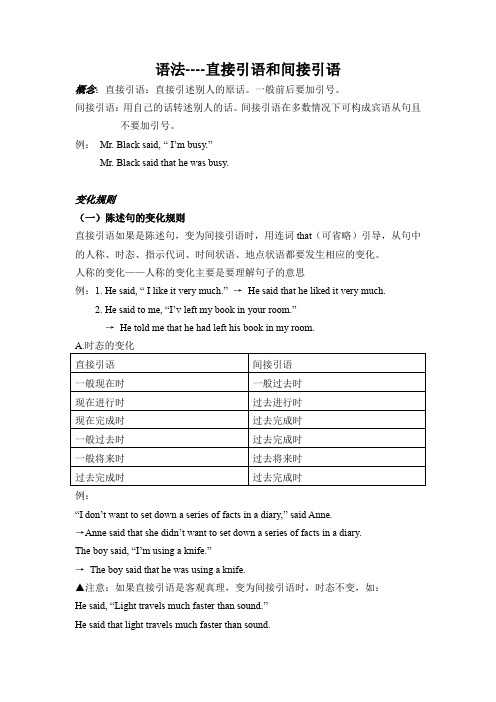
语法----直接引语和间接引语概念:直接引语:直接引述别人的原话。
一般前后要加引号。
间接引语:用自己的话转述别人的话。
间接引语在多数情况下可构成宾语从句且不要加引号。
例:Mr. Black said, “ I’m busy.”Mr. Black said that he was busy.变化规则(一)陈述句的变化规则直接引语如果是陈述句,变为间接引语时,用连词that(可省略)引导,从句中的人称、时态、指示代词、时间状语、地点状语都要发生相应的变化。
人称的变化——人称的变化主要是要理解句子的意思例:1. He said, “I like it very much.”→He said that he liked it very much.2. He said to me, “I’v left my book in your room.”→He told me that he had left his book in my room.例:“I don’t want to set down a series of facts in a diary,” said Anne.→Anne said that she didn’t want to set down a series of facts in a diary.The boy said, “I’m using a knife.”→The boy said that he was using a knife.▲注意:如果直接引语是客观真理,变为间接引语时,时态不变,如:He said, “Light travels much faster than sound.”He said that light travels much faster than sound.(二) 祈使句的变化规则如果直接引语是祈使句,变为间接引语时,要将祈使句的动词原形变为带to的不定式,并根据句子意思在不定式前加上tell/ask/order等动词,如果祈使句是否定句,在不定式前面还要加上not。
- 1、下载文档前请自行甄别文档内容的完整性,平台不提供额外的编辑、内容补充、找答案等附加服务。
- 2、"仅部分预览"的文档,不可在线预览部分如存在完整性等问题,可反馈申请退款(可完整预览的文档不适用该条件!)。
- 3、如文档侵犯您的权益,请联系客服反馈,我们会尽快为您处理(人工客服工作时间:9:00-18:30)。
A、C、D各项均属错误。Advice前不能
用不定冠词,但可被some,much,a lot
of/lots of,a piece of,a bit of,a word
of等修饰。
高考链接
4. I wonder how he _D___ that to the teacher.
A. dare to say
2. 如果直接引语所表述的内容在目前和说话时 同样有效,变间接引语时,时态可不变
The children said, “We love this game.”
They told us that they love that game.
3.主句谓语动词的时态是现在时态,在引述时, 时态不变。 She says, “I’ll never forget the days in the country.”
• He said to us that he had been to the Great Wall.
• He said, “I'll give you an examination next Monday. ”
He told us / said that he would give us an examination the next Monday.
2. 转述他人的疑问→一般疑问句 He asked, “Are you a teacher?”
→ He asked me if /whether I was a doctor.
3. 转述他人的问题→特殊疑问句
She said , “What are you doing?” → She asked me what I was doing.
B. dare saying
C. not dare say D. dared say
解析:答案D。本题主要考查了dare作为 情态动词和实义动词的基本用法。作为实 义动词,dare有人称、数和时态的变化, 故dare to say与主语he相悖;dare doing 结构本身错误;dare的否定形式应为dare not do(情态动词)或don’t/doesn’t/didn’t dare (实义动词) to do。
3.特殊疑问句:
When do you harvest the wheat ? ( They asked him )
you harvest the wheat
They asked him When you harvest the wheat.
he
harvested They asked him when he harvested the wheat.
been built in our country.
在直接引语变为间接引语时需要注意的变化 1. 注意时态的变化 2. 注意人称变化。 3. 注意指示代词的变化 4. 注意时间的变化 5. 注意地点的变化 6. 注意个别趋向动词的变化
指示代词
时 间 状 语
地点状语 方向性动词
直接引语
间接引语
this, these that, those
A. get over
B. get in
C. get along
D. get through
解析:答案C。本题主要考查具体语境中 get短语的用法。全句意为:尽管读者不 知道每个单词的确切含义,但他们能够很 好得读懂,即读书进展得顺利,故用get along。
高考链接
2. It’s hard for me to imagine what I would be
doing today if I ___B___ in love, at the age of
seven, with the Melinda Cox Library in my hometown.
A. wouldn’t have fallen B. had not fallen
C. should fall
3.Tom said “I wid that he would see me the next week.
4. “Why were you late again?” The teacher said to me. The teacher asked me why I was late again.
now, today this week yesterday
then, that day that week
the day before
last week the week before
four days ago four days before
yesterday
the day before
the day before yesterday
高考链接
3. Father went to his doctor for ___B____ about his heart trouble.
A. an advice
B. advice
C. advices
D. the advices
解析:答案B。Advice若作“忠告,劝告,
建议”讲,无论什么情况下都不可数,故
Homework
Review the knowledge of direct speech and indirect speech and summarize the rules.
解题步骤: 1.陈述句:
“I don’t like computers,” Sarah said to her friends.
two days before
tomorrow
the next day
next month the next month
here
there
come, bring
go, take
谓语动词时态变化(参见《双语报》B3), 需要注意几点:
1.直接引语表述的是客观真理,变为间接引语时, 时态不变
The geography teacher said, “The sun rises in the east and sets in the west.” The geography teacher told us that the sun rises in the east and sets in the west.
选择疑问句
•用whether…or…表达,而不用if…or…,也 不用either…or… • He asked, “Do you speak English or
French?”
• He asked me whether I spoke English or French.
• I asked, “Will you take a bus or take a train?”
D. were to fall
解析:答案B。本题考查了fall in love在虚拟语气
中的应用,从标志性时间状语at the age of
seven看,宾语从句内容意指过去。在虚拟语气
结构中,若指过去,从句中动词形式用过去完成
时,主句中谓语动词形式用would/should/might/
could/have done。
• He said, “You are interested in English, aren't you?”
• He asked whether I was interested in English.
特殊疑问句
•原来的疑问词作为间接引语的连词,主 句的谓语动词用ask(sb. )来表达,语序 改为陈述句语序
5. “I don’t like swimming,” said Sarah. Sarah said she didn’t like swimming.
6. His friends asked him if he would go to Dalian. His friends asked him, “Will you go to Dalian?”
It is easy to improve the condition of the soil.
They asked him if it is easy to improve the
condition of the soil.
asked
is
was
They asked him if it was easy to improve the condition of the soil.
She says that she’ll never forget the days in the country.
从句时态无须改变的还有以下情况:
1. 当主句的谓语动词是将来时的时候 2. 当直接引语部分带有具体的过去时间状
语时 3. 当直接引语中有以when, while引导的从
句,表示过去的时间时 4. 当引语是谚语、格言时 5. 当直接引语中有情态动词should,
7. “Have you been to Paris?” My classmate asked me. My classmate asked me if I had been to Paris.
高考链接
1. Readers can ____C____ quite well without knowing the exact meaning of each word.
一般疑问句
•间接引语用连词whether或if引导,原主句中 谓语动词said要改为asked(me/him/us等), 语序是陈述句的语序
• He said, “Do you have any difficulty with pronunciation?”
• He asked (me) whether/if I had any difficulty with my pronunciation.
